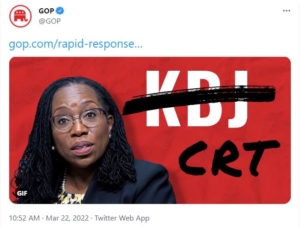This Is Not How You Wield Power: Toxic Punditry’s Lack of Self Awareness
[NB: check the byline, thanks. /~Rayne]
This is complete and utter bullshit:
“The idea that..Nancy Pelosi will write a stern letter to Clarence Thomas and he’ll open the letter & say: ‘Oh the Democrats want me to recuse myself? Ok, I’ll recuse myself.’ It’s not gonna happen! That is not how you wield power.”
Me to @AymanM tonight:pic.twitter.com/1gH5XOUcfI
— Mehdi Hasan (@mehdirhasan) April 4, 2022
We all know asking Justice Clarence Thomas to recuse himself is merely pissing into the wind. Congressional Democrats are obligated to ask this of him but they know Thomas is corrupt and won’t give the demand a second thought.
What’s bullshit, though, is MSNBC’s Mehdi Hasan and Ayman Mohyeldin ripping into House Speaker Nancy Pelosi about a request by Democrats to Thomas for his recusal on cases related to the January 6 insurrection.
We all know as well the real problem is that Thomas should be removed from the Supreme Court. Pelosi was absolutely correct saying that Thomas should never have been approved as a SCOTUS jurist to begin with. His failure to report his spouse’s income appropriately — particularly Ginni Thomas’s income from her nonprofit — during the lead up to the 2010 Citizens United v. FEC decision was unacceptable, as was his meeting with the Koch brothers.
But the House had absolutely nothing to do with Thomas being approved in the first place. The Senate is responsible for review of nominees to the Supreme Court and their approval.
We all know, too, that the House may impeach jurists, but they cannot be removed without a two-thirds vote for conviction by the Senate.
And in this case, a Senate which is only nominally held by Democrats. They couldn’t convict and remove Trump twice after impeachment for the same reason — an inadequate number of Democrats in the Senate.
Where is this power that Hasan and Mohyeldin think Pelosi has as House Speaker when she cannot remove Thomas? Why are they insisting she launch a war she can’t win? (We can see how that works out for Putin in Ukraine.)
All these two boneheaded pundits (and others making the same argument like them) are doing is misogynist pontificating when they know it’s the Senate which can force the issue and only if there were two-thirds of the Senate willing to vote to convict Thomas for his continued corrupt practices.
Yet you don’t see pundits like Hasan and Mohyeldin going after Senate Majority Leader Chuck Schumer. Nope.
Why is that?
~ ~ ~
They’re literally filling empty air time with useless crap which only serves to damage the public’s opinion of House Democrats — the portion of government which has most reliably served the needs of the people during the Biden administration while the Senate obstructs its efforts.
They’re directly contributing to and amplifying the same poisoning of public opinion already performed by right-wing media outlets Fox News, Newsmax, and OAN, grossly distorting the public’s perception of US government.
It’s right there in front of their noses and they don’t see it:
A shocking data point that explains much of Biden’s political troubles. More people think jobs have been lost over the last year (37%) than those who think they’ve been gained (28%). Unemployment is at 3.6%. https://t.co/xwRNSeAqFs
— Sam Stein (@samstein) April 3, 2022
Hello, Sam Stein, who’s with both MSNBC and Politico? You’re not doing a very good job breaking through to the public if they believe the complete opposite of the truth.
Dan Froomkin elaborated on media’s failures with help from Dean Baker; public opinion about employment is particularly telling.
An additional 21 percent didn’t know one way or the other. Only 28 percent said, correctly, that jobs were created. Less than half of those — only 12 percent — knew that it was more jobs created than in any other year in history.
Similarly, only 19 percent said they thought the U.S. economy experienced more job growth than normal in the past year. The plurality – 35 percent – said they thought more jobs were lost than usual, which is of course spectacularly wrong.
Media figures go out of their way to make sure something looks like it’s on fire or bleeding, so much so that it’s a joke.
Unemployment is so low it’s hard to find new employees: here’s why that’s bad news for Joe Biden. https://t.co/ULazOpuRN6
— Don Moynihan (@donmoyn) April 4, 2022
But sure, keep beating on House Speaker Pelosi because that will effect the change needed as will pissing into the wind.
~ ~ ~
A pre-print study found that it’s not solely the public at fault when it comes to misperception — it’s not purely partisanship which mis- or disinforms their opinions.
🚨NEW PREPRINT w/ @dbroockman. We conducted a real-world experiment to study the effects of partisan media. In Sept 2020, we paid people who normally watch Fox News to instead watch CNN. Median person was paid $15/hour for 7 hrs/week for 4 wks to watch CNN. Thread on results 1/ pic.twitter.com/JFDLSCsjlO
— Josh Kalla (@j_kalla) April 3, 2022
A key problem is the business model: audience members’ understanding and opinions could be shaped by exposure to media, if media bought their time.
Unfortunately, cable and broadcast news don’t pay their viewers. They rely on advertising and subscription volume; their programming becomes little more than reductive clickbait fighting for audience attention. They’ll run the inflammatory material which skews public opinion the wrong way because good news is boring.
It makes sense, and yet the answer to running content which is both more attention-grabbing and -retaining to viewers and the ethically responsible content to run is right there under their noses.
Assuming, of course, the media outlets aren’t forcing their pundit-anchor class to promote corporatism über alles.
Why aren’t programs like Hasan’s and Mohyeldin’s contacting every goddamned Senator and putting them on the record one at a time on camera about their position on Thomas’s failure to recuse himself and whether they would vote to convict him if impeached for abuse of his office as jurist?
I’d pay to watch them squirm. I’d pay to watch Senators’ chiefs of staff run away from mics to avoid answering.
I’d pay to watch them ask Josh Hawley, Ted Cruz, and Tommy Tuberville if Thomas should recuse himself on any lawsuit in which they may be named as co-conspirators because Thomas’s wife Ginni sided with Hawley and Cruz on overturning or obstructing the election…and was it obstruction of Congress or overturning an election in which they had been encouraged to participate?
That’d be Must-See TV.
~ ~ ~
The other person who gets off lightly all the damn time to the point every media outlet forgets he exists: Chief Justice John Roberts.
He’s the administrative leader of SCOTUS. Every decision made during his tenure will be attributed to the Roberts’ court.
Clarence Thomas’s unmitigated corruption including the damage to democracy Thomas’s role in Citizen United played is the product of Roberts’ court.
The lack of a self-imposed binding code of conduct is Roberts’ failure. Thomas’s refusal to recuse himself from January 6 cases which may be decided by SCOTUS is also his failure.
The lack of legislation requiring a SCOTUS code of conduct with adequate teeth to ensure enforcement is Congress’s fault, but primary responsibility is that of the Senate. In its absence Roberts could administer his court in a way which enforces judicial ethics.
Why wasn’t Roberts a subject of Hasan’s and Mohyeldin’s critique when Roberts clearly has the power to rein in corruption among his jurists?
~ ~ ~
But the real power to which Hasan and Mohyeldin deliberately turned a blind eye wasn’t Nancy Pelosi’s as House Speaker.
It wasn’t even Chuck Schumer’s, or John Roberts’ power.
That pre-print study says it’s their own. How convenient these media figures with a bully pulpit have a handy favorite punching bag to use as clickbait, redirecting attention away from their own failures as media figures with sizable audiences whose perception they shape.
By the way, you have power, too. You should be exercising it by calling your representative and senators and demanding legislation to implement a code of ethical judicial conduct for the Supreme Court (since Roberts appears unable or unwilling to produce one), and impeachment and conviction of Clarence Thomas for his lack of ethics as a jurist.
Congressional switchboard: (202) 224-3121





